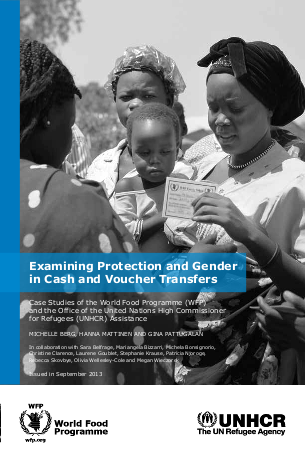
In any humanitarian intervention – including those using cash and vouchers – aid agencies need to identify the most appropriate, effective and efficient way of helping crisis-affected households meet their needs. In doing so, they must consider the protection and gender issues surrounding the intervention strategy.
Over the years, many aspects of cash and voucher transfers have been analysed. However, there has not been a substantive study specifically devoted to the protection and gender implications, both positive and negative, of such programming. In response, in October and November 2011, WFP conducted a literature review of previous studies of cash and voucher transfers to investigate whether such transfers were working towards improving protection of (or at least doing no further harm to) beneficiaries, and what impact they could have on gender and community dynamics. In addition, WFP Headquarters sent a short questionnaire to its field offices to gather observations on the impact of cash and voucher transfers on protection and gender in their programmes.
The initial research revealed ten potential protection and gender issues in the context of cash and voucher transfers. These involved: i) identification (for example, not having any identification and therefore having no access to aid or to technology to get cash); ii) targeting (how to include all target groups); iii) safety (of cash and vouchers, and of beneficiaries and staff) and corruption; iv) cash-for-work (CFW) activities (safety and protection of workers); v) household violence (potentially increasing); vi) additional burdens placed on women; vii) cash and vouchers creating a disincentive to work; viii) social jealousy, especially because cash and vouchers (or goods purchased with them) may not be shared; ix) technology (especially for older or illiterate individuals); and x) polygamous households (and the sharing of cash and vouchers within such families). Most of these issues also affected in-kind assistance, and thus were not unique to cash and vouchers.
WFP and UNHCR embarked on field research designed to examine cash and voucher transfers in their programmes, in terms of potential protection and gender implications, in line with the concerns that arose from the literature review.